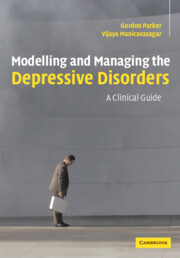
-
Select format
-
- Publisher:
- Cambridge University Press
- Publication date:
- August 2009
- July 2005
- ISBN:
- 9780511544194
- 9780521671446
- Dimensions:
- Weight & Pages:
- Dimensions:
- (247 x 174 mm)
- Weight & Pages:
- 0.537kg, 260 Pages
- Subjects:
- Psychiatry and Clinical Psychology, Medicine, Psychiatry
You may already have access via personal or institutional login- Subjects:
- Psychiatry and Clinical Psychology, Medicine, Psychiatry
Book description
The DSM and ICD mental illness classificatory systems define mood disorder as essentially a single condition varying only by severity; however, there are major problems with this approach. In this book, Gordon Parker and Vijaya Manicavasagar expose the weaknesses in the existing models, and describe a new approach to sub-typing and managing depression based on there being some specific defined manifestations, including melancholia and psychotic depression, as well as versions of the condition highly dependent on life stresses and personality styles. They argue that depression can exist as a disease, a disorder, a syndrome and a normal reaction, and it therefore requires a multi-modal approach to conceptualization and management. Highly illustrated in full colour throughout and written in an entertaining, but informative and practical style, this book should be read by all those responsible for managing or caring for individuals with mental illness.
Reviews
‘What I found particularly refreshing about this book was the brio with which it was written … the attitude and approach displayed by the authors of this volume are surely a hopeful prognostic sign for future research in depression.’
Allan Y. Young - The Royal Australian and New Zealand College of Psychiatrists
'… these chapters … discuss the ideal attributes of a therapist and provide easily understandable case vignettes illustrating the personality disorders, [therefore] they are especially appropriate for students of psychiatry and psychology; some patients might find them a useful resource. They provide an easy-to-understand outline that would be helpful to a wide audience.'
Source: The Journal of Nervous and Mental Disease
'It's all good stuff and gets you thinking, especially about 'what is the illness I see before me, what is its likely natural history, why and how is the best way to treat it?''
Source: Australia and New Zealand Association of Psychiatrists in Training
'… this is a well-written book and the regular use of summary boxes and case vignettes makes it highly readable. The research expertise and clinical experience of the authors come across strongly and will make the book particularly attractive to clinicians. The provocative nature of the first section will cause many to challenge their view of depression. This book is highly recommended.'
Source: Journal of Psychosomatic Research
Contents
Metrics
Full text views
Full text views help Loading metrics...
Loading metrics...
* Views captured on Cambridge Core between #date#. This data will be updated every 24 hours.
Usage data cannot currently be displayed.
Accessibility standard: Unknown
Why this information is here
This section outlines the accessibility features of this content - including support for screen readers, full keyboard navigation and high-contrast display options. This may not be relevant for you.
Accessibility Information
Accessibility compliance for the PDF of this book is currently unknown and may be updated in the future.


